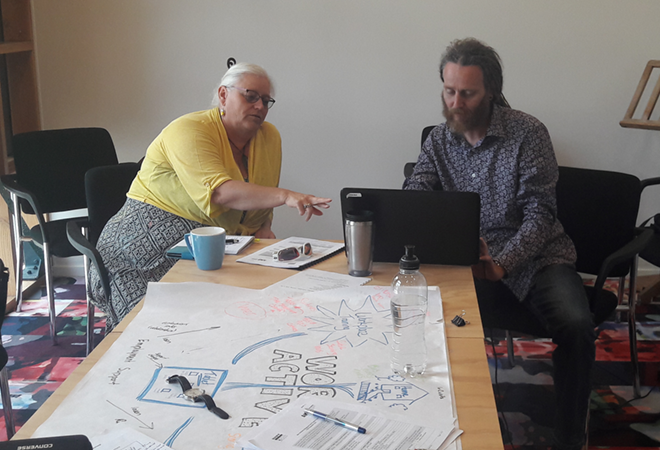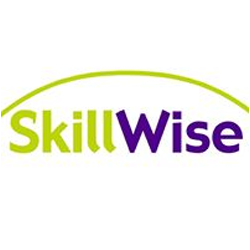
PROJECT
Work Active: Supporting the "forgotten learners" in their journey to work
Employability,
Supporting learners,
Learner access and pathways,
Workplace learning,
Adult and community education,
Literacy and numeracy skills
Status
Completed: 1 October 2020
Project Details
A 15-month project undertaken by SkillWise to trial a new approach to teaching and learning (Work Active), with an employment focus, for adult learners with an intellectual disability.
Aims:
This project set out to increase employment outcomes for adults with intellectual disability through:
- the development of a teaching and learning framework based on a collaborative approach that maximises the potential for sustainable employment for adults with intellectual disability
- the development of a set of resources that meet the participants' learning needs and ensure the retention of knowledge
- development of job specific skills, together with a range of soft skills.
Methodology:
The project took an action research approach with a focus on testing a set of ideas about what will enhance the learning process and maximise the outcomes for learners with an intellectual disability.
Team

John Grant
Project Lead
SkillWise
Gavin Muir
SkillWise
Tracey-Anne Cook
SkillWise
Nelleke Passchier
SkillWise
Roger Walker
SkillWise
Tracy-Jane McCutcheon
SkillWise
Dr Maria-Victoria Perez-Y-Perez
University of CanterburyStatus
Funding
$23,110.00 (excl GST)
$9,990.00
Regional Hub Project Fund
$13,120.00
SkillWise
Key Findings
- Class-based Learning Reflection Reflection - Sharing work experiences and providing feedback in group discussion is a central feature of the classroom based work. Students discussed what was working well and explored why and what wasn’t. These discussions also helped to inform the role plays that students recorded and posted on the closed Facebook page. Learners described these class reflections in terms of ‘helping you to think about the day’.
- Technologies - The use of technology was observed to be a key component in the learning process for learners. At the beginning of the programme, all learners were provided with a tablet to undertake their classroom work: using Microsoft Word documents; creating PowerPoint presentations to document their learning and work experience journey; using Dropbox to share resources; interacting on a closed Facebook page specific for the programme. Learners used the tablets both in the class environment and at home. For some of the learners, they were also expected to use technology in the work place, drawing on their digital skills as part of their work tasks.
- Learning Spaces - The class-based learning component of the programme took place in a central building in the University of Canterbury (UC). In addition, two students undertaking a UC Arts internship took part in class-based learning as class assistants.
- Internships - Internships provided the opportunity to measure/assess the employability of learners – to see if there was a ‘fit’. For some learners, getting work experience through the internship component of the Work Active learning programme signified moving forward towards a goal of paid employment - a stepping stone towards their goals.
- ‘Job Ready’ Realising potential - When discussing being ‘job ready’, employers noted that though there are general requirements of undertaking and completing job specific tasks, they also looked for individual qualities of the potential employees and what they may bring to the job and workplace. Being ‘job ready’ was described in a number of ways, such as:
- being motivated for paid work
- preparing for job interviews
- having a sense of workplace expectations
- the ability to manage multiple tasks and their own stress levels.
- Meaning of work - The meaning of work for learners was described by drawing on the concept of identity. Being a worker provides a sense of belonging to the working population.
Key Recommendations
- The involvement of just six learners enabled an intensive approach both in the classroom and in terms of workplace support.
- In terms of internships, the flexibility of employers made a significant difference regarding the quality of the work placements and the type of work that learners were assigned and support provided within the workplace setting.
- The location of the programme within a tertiary institution provided the opportunity for learners to mix with the university community and generally participate in university life – to feel comfortable to ‘inhabit’ university spaces.
- Participating in a programme like “Work Active” resulted in building relationships that provided further opportunities for job seekers.
- Consult more broadly with all key stakeholders to discuss specific research aims pertinent to stakeholder groups as part of the planning stages of the Work Active project.
- Include more opportunities for the broader team of the service provider and engage in reflexive discussion throughout the project.
- Clearly identify roles for all collaborators throughout the PAR process – revisit membership of the advisory group and ask how well we are representing all key groups'/stakeholders’ interests.
- Employment service coordinators were unclear in terms of the difference between an internship and work placement. Clear communication and consultation between sectors would have improved the selection of internships for the project.
A report detailing the 15-month project undertaken by SkillWise, to trial a new approach to teaching and learning (Work Active), with an employment focus, for adult learners with an intellectual disability.
- 30 September 2019